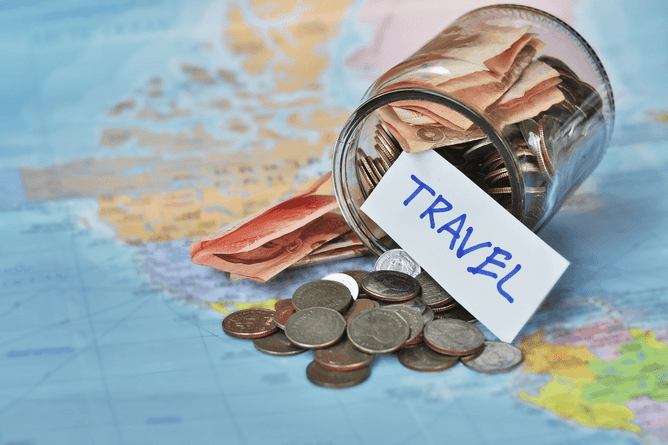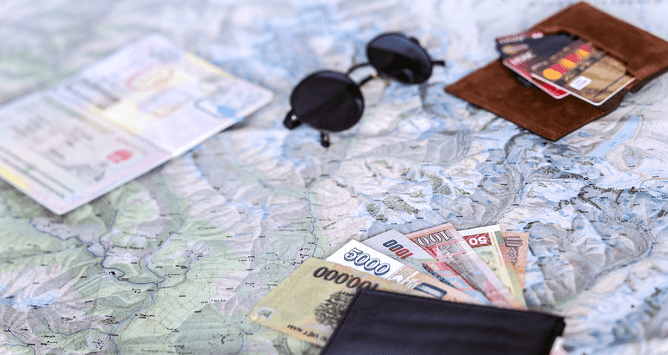So you’ve got your tickets booked, your accommodation is locked in, and you’ve started the countdown to when you can pack. Now what about the logistics of being in another country? Unless you’re off to an all-inclusive resort you’re probably going to have to access some money at some point on your trip.
There are a few different ways of accessing funds overseas including exchanging foreign currency (cash), using your NZ credit/debit card, or using a pre-loaded travel currency card.
HOW TO ACCESS TRAVEL MONEY OVERSEAS
Foreign currency (aka cash)
Available through your bank, a currency exchange shop or (as a last resort) from the airport, I personally like to have a little cash on hand for when you first step foot in a new country. In some countries it’s more necessary than others, but I find around NZD$100 in small denominations is a good starting point and usually gives you enough for tips, a taxi and a snack on your first day.
Others prefer to only use cash on their travels, which is fine as long as you’re sensible about how you carry it. Always split your cash supply and store in separate places, never carry more than you need when you’re out sightseeing, and don’t rely on money belts etc being safe from pickpockets just because they’re under your clothing.
BONUSES:
No fees other than whatever you’re charged at the initial exchange
Thieves/merchants can’t get access to your other accounts when you use cash
Can be handy for tipping, bartering and small purchases
Is good for budgeting because you always know exactly how much you have
DRAWBACKS:
Carrying large amounts of cash can make you a target for theft
Cash often isn’t covered by travel insurance
Can become confusing if you need multiple currencies throughout your trip
May take weeks to order from your local bank
If you have leftover currency it may not be exchangeable when you get home (especially small amounts or coins), or the rate may have changed so you lose value.
Credit Cards
Credit cards are virtually a must-have for travel these days, as most hotels and car hire agencies will “hold” funds on a card in lieu of a bond when you check in. If you don’t have a card they will usually accept a cash deposit, but keep in mind that this may be quite a bit higher than the credit alternative.
I recommend getting a credit card specifically for travelling with – get it from a different bank from your other accounts so they can’t be compromised, and have your limit just enough to cover a week or so of deposits, as these can take several days to be refunded to your card.
Every bank has it’s own rules regards overseas use and it always pays to check the fee schedule before you leave. Don’t forget to ask if your bank is affiliated with any overseas banks, as they often have cheaper (or even free) fees for using affiliate/partner bank ATMs.
On that note, make sure you let your credit card provider know that you are heading away, or they may assume your number has been stolen if they start seeing foreign transactions popping up on your statement. The last thing you want is for your card to be frozen when you’re mid-holiday!
BONUSES:
Ideal for providing a deposit/bond for hotels or car hire.
Visa and Mastercard both have guarantees in place that you won’t be held liable for fraudulent purchases.
Easy to top up via internet banking, and funds usually appear instantly if you’re transferring within the same bank.
You can continue to accrue points on your reward program while on holiday.
DRAWBACKS:
Fees vary greatly and aren’t always charged instantly, which makes it hard to budget effectively. In some cases you may be charged fees from the local banks as well as your own bank.
Not all merchants accept foreign credit cards.
If your card is stolen or details copied the thief has access to all of your accounts.
Exchange rate can be different for every purchase, so you never really know how much things are going to cost.
Multi-Currency Card
A currency card is essentially a debit card set up specifically for travel purposes. Although they’re run by Visa and Mastercard there is no actual credit facility on these cards – you load them up with funds before and during your travels.
The biggest difference between these and a normal credit or debit card is that they can hold several different currencies at once – so you can effectively lock in a good rate in the months leading up to your trip.
Recommended currency cards -
BONUSES:
Not linked to any of your bank accounts
Preloaded so you can’t overspend
Can hold several different currencies at once – handy if you have stopovers!
Set fees
Easily reloadable online
Exchange rate is locked in so you know exactly how much you have in the local currency
Leftover funds are easily accessed in New Zealand, or you can leave them on the card for the next trip
Can earn reward points
DRAWBACKS:
Reloads can take 24-72 hours to process
May not be accepted by all merchants
Not recommended to use as a bond guarantee in hotels etc
TRAVELLER FEEDBACK
Chloe @ Chloe Creates
“My OneSmart card serves as my back up card in case I lose everything else. It’s also good for collecting airpoints at the petrol station.”
“Cash can get you out of any situation such as a $2 ‘tourist fee’ that can make a non-existent problem go away, and the card takes too long to load. When you’re traveling, you don’t need money overnight, you need it now! And you definitely can’t afford for your money to be stuck in no man’s land while you wait for the weekend in NZ to end.”
“No matter where I am in the world, using a main bank ATM always gives me the best exchange rate. Better still, some NZ banks have reduced their foreign bank withdrawal fees, and if you’re with a bank that is part of a global alliance (Westpac NZ for example) using an affiliated bank has ZERO withdrawal fees.”
Jenny @ Ukuchic
“We found a travel card very useful on a number of trips overseas to the USA. It was used most in supermarkets, stores and petrol stations.
Overall I would recommend the Kiwibank travel card.”
Amy @ Bookprint Ltd
“I loved using a currency card. Loading is easy via bank transfer and the money is in the [right] currency so we were free to swipe away even for small purchases and not worry about service margins or conversion rates each time.
I’m not convinced it’s the cheapest way of converting travel money – but the ease and the security is so great that I didn’t really check.”








